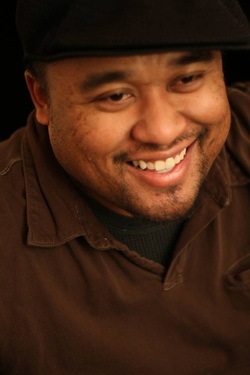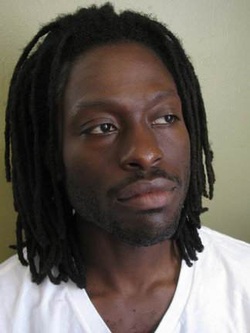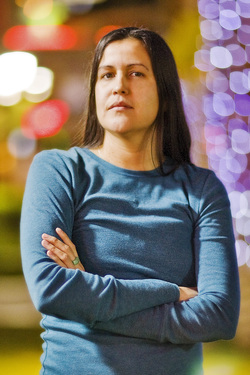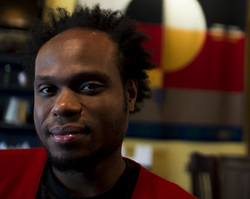 When I was living in Oakland a few years ago and regularly attending poetry slams, Jason Bayani was among my favorite poets to watch. His work could be boldly comic, which I loved, but more often, Bayani's poems were intricate, passionate love letters to the places and people important to him. I always found him to be an artist of great feeling. In the years since, Bayani has worked very hard to develop his craft. He is deft with technique, but one of the things I most admire about him – as an artist and a man – is his unwavering sincerity. Bayani never forgets who he is, and where he comes from, and there's immense power in that. I hope you'll agree. * KEIN/MUENCHEN These shoes were not made to walk in snow. I must have slipped on the ice seven times before eating it in the botanical garden. There are several ways to get “got” in a city. The prime offense is to always be looking up. I couldn’t help it though. I’ve never seen the street break form like this. Munich is so gutteral and heavy on the tongue. The buildings are an impractical math. I am relearning shape. The city where I love is a grid, a digital timepiece: bending and folding: in and out of space. Here the streets are series of gears; the metal and the motor; all of it turning; the great wheel of time; it is breaking me; I am broken; I came here broken. I can say that now. There is enough time to say this. Today, being around people who speak a different language than me feels like less pressure. Bitte, bitte means please, but sounds so much like bitter. Kein, under my breath I repeat the word kein: I have no, I speak no, I am without. A poet told me she wouldn’t be able to translate one of the lines from my poem: “I love you in this city”, and make it sound right. She said it wouldn’t sound sincere. I didn’t tell her, the person I wrote it for didn’t think so either. I would have tried to make it sound like a joke. She wasn’t getting my jokes. Instead she wrote one of my other lines on the wall: What else would it mean to be human if not a lost thing. I could have fell for her but I didn’t. Maybe when we say love, we mean a safe place to fall apart. I feel like Richie did that first night we took acid. Around 5am he said, “When is this shit gonna be over?” I’m listening to Junior tell me the same thing he told him, “Later.” You know how at some point, some asshole always ends up asking you the question, “If you were a superhero, what power would you have.” I hate that question. There’s a superhero who talks to cities, but you don’t want to have to explain who Jack Hawksmoor (God of the Cities) is. So you say what everyone else would say, I’d fly. I wish that maybe someone would say, I would spit medicine into my palms. Or, I get stronger whenever I experience grief or loss and the more grief or loss I experience, the stronger I get. Don’t make me sad. You wouldn’t like me when I'm sad. Then maybe talking to cities wouldn’t be such an outlying notion. Even today, in a place as cold and unfamiliar as Munich is this morning. If I were a superhero I would talk to cities. Maybe to hear it say five more minutes, come back to bed. Some feral hound nuzzling its way between us. I think of all the parts of me I am losing. How none of it makes me stronger, just different. I wonder if I’ll ever be myself again. And if not, why would that be such a bad thing. Munich, I am without. When I slipped on the ice nobody laughed. I’ll get you for this, but you got me. You got me son. * Jason Bayani is a graduate of Saint Mary’s MFA program in Creative Writing. He is a Kundiman fellow and a veteran of the national poetry slam scene whose work has been published in Fourteen Hills, Muzzle Magazine, Mascara Review, the National Poetry Slam anthology, Rattapallax, Write Bloody’s classroom anthology, Learn Then Burn, and other publications. As a member of 7 National Poetry Slam teams, he’s been a National Poetry Slam finalist and represented Oakland at the International World Poetry Slam. He is also one of the founding members of the Filipino American Spoken Word troupe, Proletariat Bronze, and has been an organizer for the Asian and Pacific Islander Poetry and Spoken Word Summit. His first book, “Amulet,” was published in 2013 through Write Bloody Press and has garnered acclaim in literary magazines such as Zyzzyva and Glint,  I'm currently enrolled in a low-residency MFA program, and because of its solitary nature, I don't get to see much of my peers' work. My program also trends a bit older, so several of the writers I'd recommend aren't elligible for this list. But I do want to highlight one who meets the criteria. From what I've read, Jen Sperry Steinorth's work falls into two major types. Roughly half the poems she makes are small, clean and composed. The other half are wild and sprawling – and these are the poems that most fascinate me. I love Jen's daring. She takes big risks with form and association, flaunting her imagination. It's not easy to make a poem like this fly, but Jen's energetic philosophy and quirky humor make me want to read these strange, lovely works again and again. I'm excited to see how she continues to explore in years to come, and you should be, too. * Jennifer Sperry Steinorth is a builder and designer in northern lower Michigan. Her poems have appeared in Pleiades, Tar River, The Louisville Review, A River and Sound Review, The Southeast Review Online, Wake: Great Lakes Thought and Culture and elsewhere. Her chapbook, Forking the Swift, was published in 2010 by Michigan Writers Cooperative Press. She is a student in the MFA program at Warren Wilson.  I think it's fantastic that so many writers on this list have recently – or will soon be – coming out with new books. At earlier points in this series, I've mentioned a few I'm looking forward to, and I'd like to add another to the list: Roger Reeves' first collection. The poems I've read of Roger's have in common a voice that is uniquely powerful. Far-ranging in his cultural references and nuanced in the tone he employs, I'm still always struck by the assertive confidence of his speakers. I always get the sense that Reeves knows he has a right to be here, and heard. And with this kind of visceral lyric, I agree: give this man a crown. The following poem will appear in King Me. * Some Young Kings The Mike Tyson in me sings like a narwhal minus the nasally twang of sleeping in a cold ocean, the unsightly barnacles latched to the mattress of skin just below my eye, the white horn jutting out from the top of my head-- oh god bless us mutts—the basset-blood- hound mulattoes, the pug-mixed puppies left behind the dog pound’s cinder-block walls as German Shepherds, Labradoodles, and Portuguese Water-Dogs turn their inbred behinds and narrow backs at our small-mouthed blues. It’s hard to smile with an ear in your mouth, two names, and a daughter hanging by a thread from the railing of a treadmill. Oh neck and North Carolina and a white coat of paint for all the faces of my negro friends hanging from trees in Salisbury. Greensboro. And Guilford County. The hummingbirds inside my chest, with their needle-nosed pliers for tongues and hammer-heavy wings, have left a mess of ticks in my lungs and a punctured lullaby in my throat. Little boy blue come blow your horn. The cow’s in the meadow. And Dorothy’s alone in the corn with Jack, his black fingers, the brass of his lips, the half-moons of his fingernails clicking along her legs until she howls-- Charlie Parker. Charlie Parker. Charlie Parker. Oz is a man with a mute body on an HBO original show that I am too afraid to watch for fear of finding my uncle, or a man that looks like my uncle, which means finding a man that looks like me in another man’s embrace or slumped over a shiv made from a mattress coil and a bar of Ivory soap. Most young kings return home without their heads. It’s 1941, and Jack Johnson still loves white women, and my mother won’t forgive him. If she can’t use your comb, don’t bring her home, my mother says in 1998. It’s 2009, and I still love white women. Charlie Parker. Charlie Parker. Charlie Parker. Often, I click the heels of my Nikes together when talking to the police, I am a cricket crushed beneath a car’s balding black tires. Most young kings return home without their heads. * Roger Reeves's poems have appeared or are forthcoming in journals such as Poetry, Ploughshares, American Poetry Review, Boston Review, and Tin House, among others. Kim Addonizio selected “Kletic of Walt Whitman” for the Best New Poets 2009 anthology. He was awarded a 2013 NEA Fellowship, a 2013 Pushcart Prize, a Ruth Lilly Fellowship by the Poetry Foundation in 2008, two Bread Loaf Scholarships, an Alberta H. Walker Scholarship from the Provincetown Fine Arts Work Center, and two Cave Canem Fellowships. Recently, he earned his Ph.D. from the University of Texas and is currently an assistant professor of poetry at the University of Illinois, Chicago. His first book, King Me, is forthcoming from Copper Canyon Press in October 2013.  As a devoted reader and student of poetry, I sometimes find myself obsessed by the mechanics of poems: what, exactly, makes any given poem work? How does any given poet use any given craft element to her benefit? Some of us can write movingly in a more intuitive fashion, without ever wondering out loud what makes our poems work, and some of us are compelled to ask, again and again. I don't know Natalie Diaz personally, but I saw her speak on a panel at the Brooklyn Book Festival a few weeks ago, and I got a good impression of her highly exacting mind. I loved how seriously she considered the questions posed her, and the intelligence of her answers. Before that, though, I had the chance to read some of Diaz's wonderful poems. If I had to pick my favorite aspect of her style, image would come out on top. Diaz's imagery is remarkable. When she creates a picture or an icon, it's gorgeous, important, and resilient. Image is one of the cornerstones of great poetry, and Diaz is establishing herself as a master of this element. This is one of many things she does well, of course - but I find myself savoring the resonant sensations her poems impart days and weeks later, and I hope they'll thrill you, too. The poem below was previously published in Diaz's book, When My Brother Was an Aztec, published by Copper Canyon Press. * When the Beloved Asks, “What Would You Do If You Woke Up and I Was a Shark?” My lover doesn’t realize that I’ve contemplated this scenario, fingered it like the smooth inner iridescence of a nautilus shell in the shadow-long waters of many 2 a.m.s—drunk on the brine of shoulder blades, those pale horns of shore I am wrecked upon, my mind treading the wine-dark waves of luxuria’s tempests-- as a matter of preparedness, and because I do not sleep for fear of such things, and even other things—I’ve read that the ocean is a large pot of Apocalypse soup soon to boil over with our sins-- but a thing is a thing, especially if it’s a 420-million-year-old beast, especially if you have wronged as many as I. Beauty, it is simple, more simple than a beloved can imagine: I wouldn’t fight, not kick, flail, not carry on like one driven mad by the black neoprene wetsuit of death, not like sad-mouthed, despair-eyed albacore nor blubbery pinnipeds, wouldn’t rage the city’s flickering streets of Ampullae of Lorenzini, nor slug my ferocious, streamlined lover’s titanium white nose, that bull’s-eye of cartilage, no, I wouldn’t prolong it. Instead, I’d place my head onto that dark altar of jaws, prostrated pilgrim at Melville’s glittering gates, climb into that mysterious window starred with teeth—the one lit room in the charnel house. I, at once mariner, at once pirate, would navigate my want by those throbbing constellations. I’d wear those jaws like a toothy cilice, slip into the glitzy red gown of penance, and it would be no different than what I do each day—voyaging the salt-sharp sea of your body, sometimes mooring the ports or sighting the sextant, then mending the purple sails and hoisting the masts before being bound to them. Be-loved, is loved, what you cannot know is I am overboard for this metamorphosis, ready to be raptured to that mouth, reduced to a swell of wet clothes, as you roll back your eyes and drag me into the fathoms. * Natalie Diaz was born and raised in the Fort Mojave Indian Village in Needles, California. She is Mojave and an enrolled member of the Gila River Indian Tribe. She was part of the Old Dominion Lady Monarch basketball team that made it to the NCAA Championship game in 1997. After playing professional basketball in Europe and Asia for several years, Diaz returned to Old Dominion and completed a double-MFA in poetry and fiction. Her first poetry collection, When My Brother Was an Aztec, was published by Copper Canyon Press in May of 2012. She was awarded a 2012 Lannan Literary Fellowship, the 2012 Narrative Prize from Narrative Magazine, and a 2012 Native Arts & Culture Foundation Artist Fellowship. Diaz is part of the IAIA low residency MFA faculty in Santa Fe and currently lives in Mohave Valley, Arizona, where she directs the Fort Mojave Language Recovery Program, working with the last remaining speakers at Fort Mojave to teach and revitalize the Mojave language.  Brevity is overrated. I love a fine tweet as much as the next gal, but occasionally, I wish more poets would dare to be oceanic, to swarm and envelop me with their words instead of throwing a small polished stone in my general direction. John Paul Davis is a great poet to read in moments like these. There's a Whitmanesque quality to his poems, effusive and generous – and characterized by endless fascination. Like Whitman, Davis is enraptured by the people he encounters, and inspired by them. I first met Davis a few years ago in Chicago: he was my neighbor, and we also worked creatively together. During those times, what always came through for me first was his curiosity about other human beings, how he sparkled and leaned in when he had a question or a quip, and how much he cared about representing the people he knew well. His poems have the same emotive engine: they expand, and thrum. Davis is a fascinating, underrated poet. Please enjoy this small example of what he can do. * In Praise Of Loud Women Starting with the ones at the poetry open mic shows but not just those under the spotlight, also the bartender with the lightning-sharp laughter who hushes the chattering men camped on barstools when the next reader taps the microphone & unfolds the looseleaf from her pocket & there's the ones with glitter eyeliner & skin-tight mini skirts on the subway filling the car with with the nasal music of their hopes & gossip while we tunnel beneath the East River toward Brooklyn & thank you for all of them, they have made my favorite days like that Saturday moving from bar to bar with Lynne & Tish & Syreeta giving me the side eye & Lizz met us & the stories only got louder, & I consider myself lucky to have so often heard Marty's hard-earned wisdom & prosody reverberate through an entire room & Rebecca's warm contralto speaking fragments of Chekhov, Elizabeth in arms about some new political injustice on tv & Chelsy, who bit my wrist to let me know she liked me & even Alecia rattling my mobile phone with her anger, her name will never stop meaning light & could I have listened to her with more of myself & Paige, famous for starting arguments on the internet called me delightful & Rae's Ohio drawl ricocheting up & down the river assuring me I was home & Mahogany's redbone Oakland syllabics making everything into song & Emily Rose trying to talk some sense into my thick head late on one of those bitterly cold Chicago nights driving & smoking with the windows down & Adri coaching me through the grief when I tell her what the doctors have said is happening to my stepmother who could make my short name multisyllabic when I was not my best self & who taught me to want to make the good kind of trouble & she is dying & no one knows how long she has & this unjust world will lose her unrepeatable voice, so many rooms will no long resound when her Southern vowels crest brightly as she tells some story, how will the world get by without her faith & her willingness to take on the small difficult work that brings about real change & I don't think I could have become a man without her, she required grace & patience & compassion & honesty from me & what will I do without her to trouble me & tell me, what trouble can I make to make & maintain space for such blessed loudness as hers, promise me that more loud talking big laughing bold troublemaking women are stepping in to fill the empty places, what kind of light can I shine when one such woman breathes to speak & what kind of ear should a stubborn know-it-all thick man grow what kind of silence should I be learning what kind of silence what kind of silence? * John Paul Davis is a curator of Page Meets Stage. He was a founding member of Real Talk Avenue, and is the former editor of Bestiary Magazine and Em Literary. He currently lives in Brooklyn. His website is www.johnpauldavis.org  As a poet often obsessed with structure, allowing a poem to have its own way with me can sometimes be a challenge. It can be hard to relinquish control of an idea – although an idea, by its nature, is intangible. But Kenyatta Rogers is a poet with a wonderful sense of flow. My favorites among his poems tend to be associative, with connective tissue that's more intuitive than logical. To write a poem of this sort requires a highly attuned awareness of balance, and an acceptance of the fact that sometimes the poem wants to become something greater than even the creator might anticipate. Rogers has these qualities in full. The work I've chosen to include is one of my favorite list poems - versatile, funny, challenging and saddening by turns. With Rogers, you never quite know what you're going to get – but the surprise is always welcome. I'm looking forward to great things from Rogers in the next few years, and so should you. The poem below was previously published in Court Green. * Purple Music I had a dream about Thelonious Monk and in that dream I told him I missed him I told him I miss him . . . I missed him the beautiful ones you always lose the gargoyle ate them all all of them . . . he ate them I threw anything I could find rocks, I threw rocks I threw shoes I threw lamps I threw a table brick and mortar and dirt and towels I threw my mom I threw my mom I threw chairs bubble gum tables light bulbs lamps trees big blocks of wood small pills of aspirin I pulled up turnips And I threw turnips like Princess Toadstool I threw turnips thoughts and pictures and metaphors I jumped in the Atlantic and picked up the Amistad and I threw the whole fuckin Amistad and I threw bubblegum Gabriel helped me throw Metatron and then I threw Gabriel I threw purple I took small tufts of clouds and I threw clouds and 33 and a thirds and jewel cases spit hair nails caskets crucifixes chunks of cement Abraham Lincoln’s right eye the bullet that shot Franz Ferdinand Kennedy Malcolm Martin Pac Christopher Mahatma the one that started the revolution which will be televised along with the TV. I threw 1080p and 720 and standard definition and mayors and hubcaps projectors asbestos the football lock combinations and bubble gum did I say I threw the bubble gum it was 1989 and I threw bubble bum I once threw a Bible through a plate glass window and it went all the way to Tehran and this guy caught it and pissed on it and he burned it and he ate it and he shit it out all in about 15 minutes it goes through the system fast . . . * Kenyatta Rogers was the 2012-2013 Visiting Poet in English, at Columbia College Chicago where he also earned his MFA in Creative Writing Poetry. He is a Cave Canem fellow and was also a Poet-in-Residence for the Hands on Stanzas program through the Poetry Center of Chicago. His work has been previously published in or is forthcoming from Jubilat, Court Green, Reverie, Vinyl, Black Tongue Review, Cave Canem Anthology XIII, among others. He works as a teaching artist and still lives in Chicago.  Over the past ten years, Jamaal May has grown from an antsy, hungry young MC and producer, to a slam poetry champion, to a widely published and celebrated poet in literary circles. May is a genuine polymath: perhaps for that reason, he is also one of the most driven people I've met. He puts that drive to excellent use in his range of work. May understands how to write received forms better than most, using them to channel and contain emotion without allowing them to become static or overwrought. He's not a pure formalist either – May displays the same bright intelligence when inventing his own forms as well, a deep respect and care for all craft elements enhancing the power of his immense feeling. His work is very smart, and truly passionate. Look for his first book, Hum, to be published later this year, and his video previews of him reading poems from the work. The poem below was previously published in Gulf Coast. * Jamaal May is a poet, editor, and educator from Detroit, MI where he taught poetry in public schools and worked as a freelance audio engineer and touring performer. His first collection of poems, Hum (Alice James Books, 2013), won the Beatrice Hawley Award. Winner of the 2013 Indiana Review Poetry Prize, his work also appears in journals such as Poetry, Ploughshares, the Believer, New England Review, and Kenyon Review. Jamaal has earned an MFA from Warren Wilson College as well as fellowships from Cave Canem and the Stadler Center for Poetry. He is founding editor, graphic designer, and filmmaker for the Organic Weapon Arts Chapbook and Video Series (www.organicweaponarts.com) and teaches in the Vermont College of Fine Arts MFA program.  Aimee Nezhukumatathil is another poet I've never had the pleasure of meeting. A friend suggested I read her a few years ago, and it's taken me far too long to explore her poems, but I can say now that his recommendation was correct: Nezhukumatathil's work is fantastic. Nezhukumatathil has an obvious command of imagery and diction, but one of the aspects I most appreciate about the poems I've read is her intelligent pacing. In recent years, I've come to respect, more and more, poets who take their time - and I think that can still be an unusual quality in poets in their 30s. So I say this as a serious poetry nerd: Nezhukumatathil's understanding of pacing moves me. Her line breaks are fantastic. Her syntax, gorgeous. It's a real pleasure to read the work of someone who lovingly builds the trellis on which her climbing vines might thrive. I'm happy to visit Nezhukumatathil's morning glory palace, and I'm so glad she continues to grow. * DEAR END-OF-SUMMER, The time it takes for a three-toed sloth to climb down from her cecropia tree is faster than the time it took me to take a deep breath and write this. And when a snail—the very symbol of slow-time and sloth—shreds his food to bits with his radula, even that is quicker than the time I spent thinking how I could acknowledge: I need us to not end. I need you to stay with me. It’s ridiculous, outrageous—this desire to smell the button channels of your shirt, to bite your lip, fingers, even the tiny stones in your ear. Sometimes soap is the only lovely thing in a hotel room. I can do nothing with this want. The lay of dumb thin veins across my heart—like golden growing mats of sargassum in the sea—won’t budge. Instead, I stare at the profile of your beautiful nose and your top lip that I want to bite so badly and will tonight-- I assure you—before this evening ends. But if you must leave, I have to thank you, Mister End-of-Summer: for these months, for the softness of each bite into stone fruit. For pluots and peaches rinsed bright in the sun. Thank you for the grey doves that erupt from my hands. Thank you also for the quiet whimper of the blood parrotfish, bred purposely to have the smallest of mouths. * Aimee Nezhukumatathil is the author of three books of poetry, most recently, Lucky Fish. Honors for her writing include the Pushcart Prize and a fellowship from the National Endowment for the Arts. She is professor of English at SUNY-Fredonia (www.aimeenez.net).  The first thing you need to know about Matthew Olzmann is that his deadpan is impeccable. The first time I met him, I was awkward as hell, because I was already a fan of his work – and the fact that he didn't crack a smile through the whole conversation didn't help. It wasn't until later that I realized he'd been slipping dry jokes into our talk all along. I truly appreciate being surprised, which is part of why I adore Olzmann's writing so much. I'd almost describe his writing as disingenuous, it's so quietly subversive. Olzmann writes some of the best contemporary love poetry I've read, taking what many assume to be the most basic genre of our art form and transforming it into moments that can be funny, devastating, yet absolutely devotional – in other words, Olzmann's poems pay fitting tribute to the real thing. He makes it look so easy, too: one of my favorite aspects of his technique is his brilliant use of anaphora and repetition - again, elements that might seem simple, but which are exceedingly difficult to master. These are a few small examples of a marvelous body of work that only continues to grow: buy his book and find out for yourself. The poem printed below first appeared in The Southern Review. * Art of the Mime: An Educational Camp for Children This seems like such a bad idea, it can’t possibly be real, but there it is-- with a flyer promising Intensive craft workshops by today’s top practitioners. Imagine: rows of sad little children, all locked in sad little boxes of silence, all pressing their sad little hands against glass that does not exist. I mean, there must have been other options for these parents who obviously hate their kids. Perhaps catapults? An opening in the circus? Or just old-fashioned chores until they pass out from exhaustion? Nothing like sleep to silence a howling kid. And believe me, as a boy I howled until my own parents longed for ways to shut me the hell up. Why don’t you go practice your mime routine? they could’ve said. I filled the world with so much noise, they needed earplugs to pray. I threw tantrums like canisters of tear gas, put my complaints in a cannon and shot out the roof of our house. Even now, I am a sound that does not stop. I say I can’t, I need, I want, and Is there a God and yes there is and It’s Me Me Me, until, like the mine, I too am trapped in a box that can’t be seen. I too have a hand that pushes against a wall, that searches for a seam. * Matthew Olzmann's collection of poems, Mezzanines, received the 2011 Kundiman Prize and was published by Alice James Books. He has been awarded fellowships and scholarships from The Kresge Arts Foundation, Kundiman, and the Bread Loaf Writers' Conference. His poems and stories have appeared or are forthcmoing Kenyon Review, New England Review, Hobart, Necessary Fiction, The Southern Review, Gulf Coast, Hyphen Magazine and elsewhere. He is a Visiting Professor of Creative Writing in the undergraduate writing program at Warren Wilson College, and the Co-Editor of The Collagist. |
Archives
June 2024
Categories |

 RSS Feed
RSS Feed